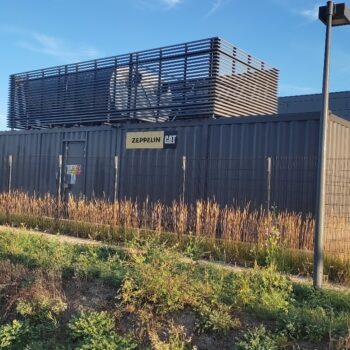Principle:
A backup power system, combining a diesel generator and a UPS (uninterruptible power supply), ensures a stable energy supply in the event of grid failure or fluctuations exceeding a certain limit. This system is especially critical for facilities that require uninterrupted power. The UPS bridges the gap during an outage before the generator kicks in, synchronizes the phases, and then takes over powering the building. The diesel generator provides long-term stability in power supply.
How it Works:
- The UPS battery system responds immediately to a grid failure, covering electricity needs within a short period (approximately 5 – 10 minutes).
- The diesel generator automatically starts up during a grid outage, supplying electricity to the system as the UPS begins to discharge—usually within seconds to a few minutes of the outage.
- The UPS battery ensures the immediate availability of energy and covers any delay before the diesel generator becomes fully operational.
- While the diesel generator is running, it supplies power to the building for the duration of the outage until grid power is restored.
- When grid power returns, the UPS recharges, the generator shuts down, and the building switches back to grid power.
- In case of a prolonged outage, the diesel generator can meet the entire backup power demand, provided there is sufficient fuel.
Key numbers:
- Electrical output: 1,600 kWh, up to 2,000 kW (sufficient for approximately 200 – 230 standard households)
- Tank capacity: 5,000 L arctic diesel
- Fuel consumption: 140–180 L/h (comparable to a regular diesel locomotive)
- Ramp-up time: up to 7 minutes for maximum power
- Battery capacity: sufficient for approximately 5–10 minutes (depending on backed-up consumption)
UPS units:
- 2 x 250 kVA (redundant operation)
- 3 x 300 kVA (parallel operation)
- 1 x 80 kVA
What it brings to us:
- Continuous Power Availability: A UPS combined with a diesel generator ensures an uninterrupted power supply, which is essential during grid outages. The UPS handles short-term outages within seconds, while the diesel generator provides long-term power support.
- Reducing the Risk of Downtime: With the UPS responding instantly and the diesel generator (DG) coming online within minutes, the risk of power failure is minimized. This ensures reliable operational continuity for critical facilities, such as our operations.
- Downtime Cost Savings: By providing an uninterruptible power supply, UPSs and diesel generators reduce the risk of losses caused by power outages, leading to lower operating costs and minimizing the economic impact.
- Energy Security and Independence: This system provides greater independence from the central power grid and enhances energy security. The diesel generator offers an autonomous power source for extended outages, which is critical in areas prone to faults or for essential operations.
- Flexibility and Scalability: A UPS and diesel generator system is flexible and scalable, allowing it to easily adapt to the energy needs of facilities of varying sizes. It can also be integrated with other energy sources, such as renewables, when needed.
- Advanced Control and Monitoring: Modern UPS and diesel generator systems are equipped with advanced control and monitoring tools, enabling efficient energy management, remote monitoring, and operational optimization. This reduces the likelihood of downtime and increases reliability.
- Promoting Sustainability: Although diesel generator backup sources often rely on fossil fuels, combining them with UPS systems and other technologies, such as renewable energy, can help reduce overall energy consumption and minimize environmental impact in specific applications.










